How Far Back Does a CPS Background Check Go?
A CPS background check will cover the individual’s entire life and will generally include criminal history records that were sealed or even expunged.
 Written by Background Check Repair
Written by Background Check Repair
Criminal Records | April 30, 2024
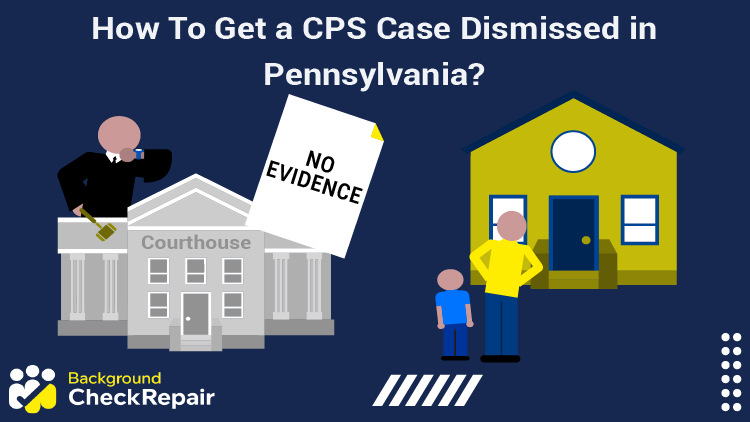
Table of Contents
Knowing how to get a CPS case dismissed in Pennsylvania is essential for parents facing a CPS investigation, in order for them to keep custody of their children.
But there are certain things that Child Protective Services will try to do, and there is very little CPS will not attempt if they have reason to believe there is abuse or neglect.
Typically, a CPS case is opened by a professional who is legally required to make a report, but there have been cases of overreach and abuse by the social system.
With a court order, CPS can remove children from a home and take away parental rights.
So, knowing how to get a CPS case dismissed in Pennsylvania is crucial to retaining your family. This complete guide explores all the options available.
When wondering how to get a CPS case dismissed in Pennsylvania, parents should first familiarize themselves with PA state law, such as the state definitions of child abuse and neglect and the state’s definitions of domestic violence,1,2 as well as any other legal distinctions that could affect custody.3
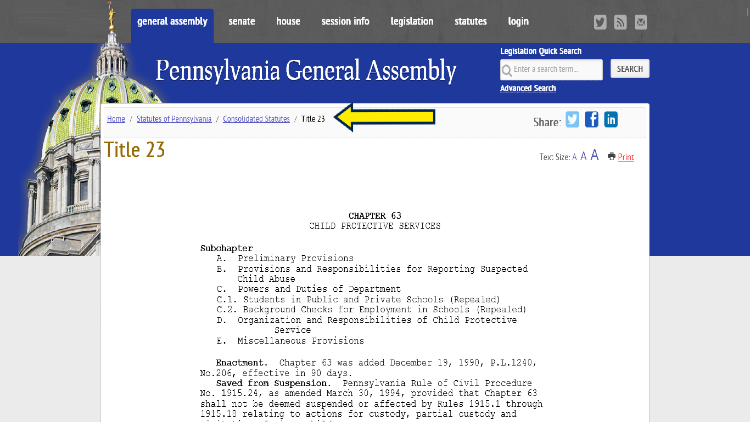
According to Pennsylvania General Assembly, the statute about Child Protective Services is under Title 23, Chapter 63.
There are some definitions of abuse or neglect that will surprise individuals. For example, parental drug use as child abuse is something that many individuals will not be aware of, as well as child witnesses to domestic violence.
This means that a neighbor can make an anonymous report about arguments in the home, and CPS will investigate. If they find that a child has witnesses domestic violence, which in some cases can include verbal abuse, parents can lose their rights in court.
Aside from local law, it’s also extremely important to know how CPS works as an agency and the CPS case procedure that they are likely to follow.
CPS is a state agency that is tasked with investigating any possible child abuse and neglect and deciding what is in the child’s best interest when it comes to child custody.
In Pennsylvania, CPS is a division of the state Department of Human Services.4
The majority of CPS cases will start with someone making a report of possible abuse or neglect.
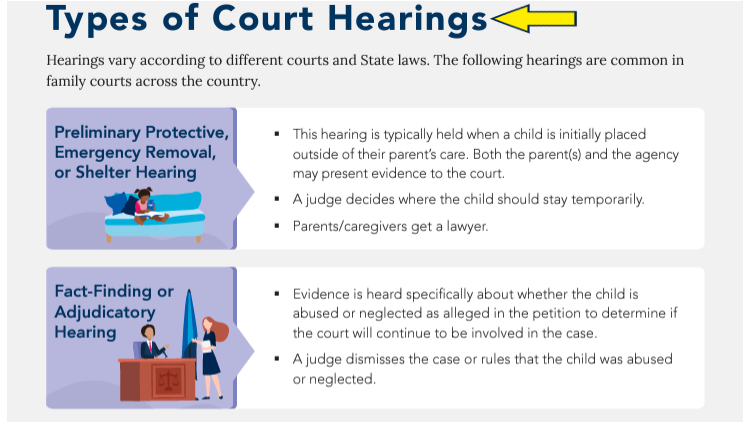
In most family courts, there are two options. The first is after a child has already been removed from a home, and the other is a fact-finding hearing.
Many people might be confused as to why is CPS in your family’s life. According to CPS case statistics,5 the most likely reason is that a mandatory reporter filed a report to CPS.
Mandatory reporters of child abuse and neglect are individuals in certain positions that are required by state law to report any possible abuse and neglect that is occurring.6 Even if a mandatory reporter makes a report that does not reveal any abuse or neglect, there is immunity for reporters of child abuse and neglect that prevents them from being persecuted, as long as the report was made in good faith.
Although there are other state laws that come into play when making and screening reports of child abuse and neglect.7
Once the case has been opened, CPS will likely try to speak with those involved in the case such as the parent accused of the abuse or neglect, the child that is the potential victim, the individual who made the report, as well as others in the household.
In many cases, CPS will show up at the individual’s house unannounced to ask questions and to see if they can do a physical inspection of the house.
Keep in mind that individuals are not required to cooperate with CPS, however, doing so may be in the best interest of the parent. This is yet another situation in which getting a lawyer as soon as possible can be helpful for a CPS case.
When learning how to get a CPS case dismissed there are two main ways that this will happen.
In the majority of cases, CPS will investigate the report and find that there is no evidence of abuse or neglect at which point CPS will simply close the case and there will be no further action or investigations.
Even in cases where there is some evidence of abuse or neglect, CPS may offer an action plan to the parents that, if followed, will allow for CPS to close the case.
This is mostly done with very minor cases, such as neglect cases that were opened due to a child not attending school. Even in these minor cases, if the parent chooses not to take the requested steps, CPS can get the courts involved and notify the judge that the parent refused to cooperate with the recommendations made by CPS.
When it comes to how to obtain a CPS case dismissed fast, getting a case closed before going to court is always the best plan as court cases are generally both expensive and tedious.
Should there be serious evidence of abuse or neglect, then individuals will likely find themselves heading to court in a CPS case. This will generally involve a hearing with a judge at a minimum, as well as the possibility of future CPS Hearings and CPS Office Meetings (if needed).
At this point, getting any signs your case will be dismissed becomes much more difficult as it will likely require that the individual file a motion to dismiss with the judge of the case who will decide based on the reasons given in the motion as to whether or not the case should continue.
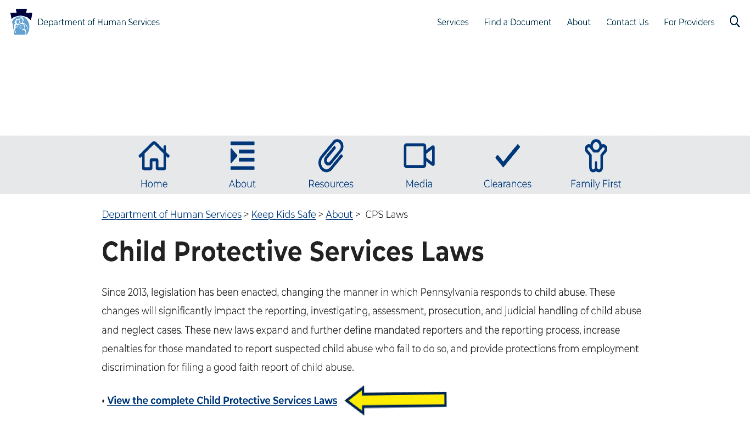
Pennsylvania’s Department of Human Services has the link to the complete list of Child Protective Services Laws.
In most cases, citing a lack of evidence that abuse or neglect has occurred is the best way to convince a judge to dismiss a case. However, this is extremely difficult as CPS likely already has significant evidence if they chose to get the courts involved in the case.
Besides lack of evidence, it is also possible to file a motion to dismiss if there were procedural issues with the way the investigation was conducted. This is why having a lawyer and understanding what CPS is allowed to do is so important.
An experienced family lawyer will know case laws that may help individuals keep custody of their children.
When learning how to get a CPS case dismissed in Pennsylvania, there are tons of factors to consider and ways to approach the situation. The better understanding the individual has of the process and laws, the better the chance that they will be able to identify something that could cause the case to be dropped.
Step 1: Contact an experienced family lawyer.
Step 2: Document the entire CPS investigation.
Step 3: Complete any steps suggested by the CPS case worker.
Step 4: Attend a hearing in front of a judge with an attorney and provide any evidence that shows there is no abuse or neglect occurring.
Step 5: Draft a motion for dismissal with an attorney.
Step 6: File the motion for dismissal with the judge.
When it comes to what CPS can and cannot do in Pennsylvania, the powers of CPS are fairly straightforward.
However, it is extremely important that individuals understand CPS Statutes & Rules as CPS could potentially lie about what they are able to do in order to trick the individual into revealing incriminating evidence.8
Although CPS is not a law enforcement agency they do have a fair amount of power when it comes to the courts.
Certain powers that are not normally granted to CPS can be granted with the help of a court order made by a judge on the recommendation of a CPS caseworker based on evidence they uncovered during the investigation.
In this case, CPS will employ the use of local law enforcement to assist them.
Perhaps the most surprising thing that CPS can do is talk to children with the parent’s permission or knowledge. This is often done while the child is at school with the help of the school administration.
CPS has this power to prevent situations where an abusive parent is able to coach their children on what to say and what not to say to avoid incriminating the parent.
Should there be evidence of serious abuse or neglect, one of the first things that CPS caseworkers will try to do is remove the child from the home for their safety. This can only be achieved with a court order, which can be obtained fairly easily if there is evidence of abuse.
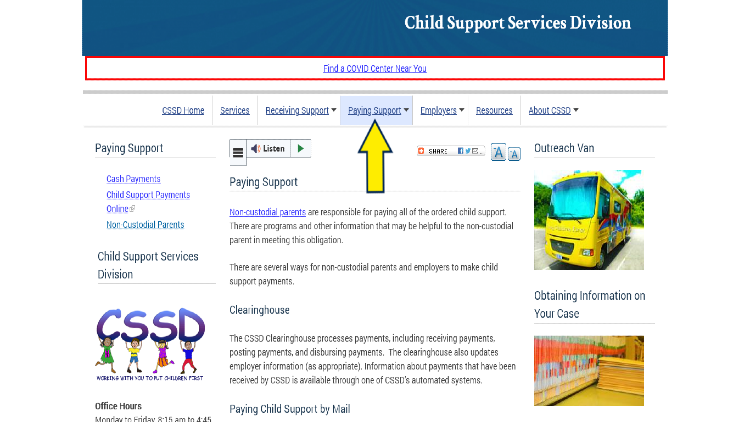
Non-custodial parents are required to pay for support. They can do that by checking the payment options in Child Support Services Division.
In most cases, the custody of the child will be transferred temporarily to the non-custodial parent if possible.9
In many cases in which the abuse or neglect is severe, CPS can advocate for the parent to have their parental rights removed. There are specific determinations that must be made to decide if the abuse or neglect constitutes parental rights being taken away which is discussed further down.
There are a few notable powers that CPS does not have without a court order that parents should be aware of as means of protecting themselves and the custody of their children.
Although CPS is known to show up unannounced and ask to come inside, individuals are not required to let them in or answer any of their questions.
CPS workers may ask to come in but in order to forcibly enter a home they are required to obtain a court order. Should they obtain one, they will likely show up at the home with law enforcement present as well as the warrant that grants them access.
Parental drug abuse is a common form of neglect and CPS will often want to drug test parents in order to see if they are abusing any illegal substances. Although taking a drug test can be an easy way to prove your innocence, CPS is not able to force someone to take a drug test.
Once again they can get a court order to force someone to do so but this would require evidence of drug abuse.
Even after a CPS case is dismissed, many people will be worried about the long-term effects and have questions like, How long does a CPS case remain on your record?
One of the reasons that this question is so common is that people might have read about child abuse background checks or CPS background checks. However, CPS cases that do not involve criminal charges will not show up on an individual’s record.
Although there will be a record of the case with CPS, these records are only used internally.
Many people will also have heard about child abuse and neglect registries. However these registries are only checked for certain jobs such as the child care background check,10 sometimes called a child abuse background check, teaching positions, and background checks for daycares.
However, the disclosure of confidential child abuse and neglect records is only given to state agencies performing these checks, not the general public.
Many people will be wondering, does CPS notify the other parent, when it comes to child abuse cases? CPS will generally notify the other parent if they are a possible caretaker for the child, such as a parent who has partial custody.
Individuals are not automatically notified by simply being the child’s parent.
When it comes to, does CPS have to notify the other parent the answer is no. Even if the other parent is paying child support, if they have no contact with the child is it unlikely that CPS would contact them.
The non-offending parent in a CPS case can also have a major impact on a CPS case. The non offending parent is simply the parent that is not under investigation by CPS.
In many cases, this will be the parent that does not have full custody of the child.
The rights of the non-offending parent include being able to attend any hearings related to the CPS case where they can ask questions, offer evidence, and offer testimony to the judge. This can heavily affect the custody of the child by the end of the case.
The non-offending parent evaluation is what is used to determine if the non-offending parent is capable of caring for the child. In cases where the non-offending parent has partial custody this will be done automatically, but if they don’t then the evaluation will be conducted by CPS.
The non-custodial parent is simply the parent that does not have primary custody of the child. This can be a parent that has only partial custody or a parent that has no custody rights at all.
The grounds for involuntary termination of parental rights are extremely important when it comes to keeping custody of your children.11 These mostly involve severe physical or sexual abuse or severe cases of neglect such as child abandonment or the child not having very basic needs met such as food and shelter.
Regaining parental rights is extremely difficult and will likely take years.
Knowing how to get a CPS case dismissed in Pennsylvania is extremely important not just to keep custody of your children but to avoid a potentially long and expensive legal battle over the case. Whenever possible, those under investigation by CPS should contact a lawyer as soon as possible who can offer advice and guide them through their state’s process.
CPS cases can be extremely intimidating and very scary. It’s essential that individuals know how CPS works to avoid any mistakes that could incriminate them and get their child taken away, even temporarily.
When it comes to how to get a CPS case dismissed in Pennsylvania, individuals will want to communicate with their lawyer and the CPS caseworker as much as possible to determine the best plan of action to retain custody.
A CPS background check will cover the individual’s entire life and will generally include criminal history records that were sealed or even expunged.
The foster parent background check is the federally required screening for individuals that want to become foster parents.
Getting a CPS case dismissed in Texas will likely involve filing a motion for dismissal with the judge overseeing the case on grounds of lack of evidence or procedural issues that make the investigation illegitimate.
Getting a CPS case dismissed in California usually involves proving that there is no evidence of abuse or neglect to justify the case being open.
In Michigan, CPS is not able to enter an individual’s home or force them to take a drug test without a court order. However they are able to talk to the children that are potential victims of abuse without the parents permission or knowledge.
New York CPS case workers are able to take away custody and parental rights by recommending this action to a judge based on evidence of abuse or neglect, the judge will then sign a court order allowing for the children to be removed. However, without a court order the powers of CPS are limited.
Ways on how to locate where someone works for garnishment is difficult since there is no employment database that is publicly accessible. However, a social media background check can sometimes be effective.
One of the ways how to locate where someone works for child support will usually involve the help of law enforcement who can get information from the SSA and IRS databases that contain employment information for individuals across the country.
1Pennsylvania General Assembly. (2023). Chapter 63 Child Protective Services. Pennsylvania General Assembly. Retrieved January 04, 2023, from <https://www.legis.state.pa.us/cfdocs/legis/LI/consCheck.cfm?txtType=HTM&ttl=23&div=0&chpt=63>
2Pennsylvania General Assembly. (2023). Section 6102 – Title 23 – Domestic Relations. Pennsylvania General Assembly. Retrieved January 04, 2023, from <https://www.legis.state.pa.us/WU01/LI/LI/CT/HTM/23/00.061.002.000..HTM>
3U.S. Department of Health and Human Services. (2023). State Statutes Search. Child Welfare Information Gateway. Retrieved January 04, 2023, from <https://www.childwelfare.gov/topics/systemwide/laws-policies/state/>
4Commonwealth of Pennsylvania. (2023). Child Welfare Services. PA Department of Human Services. Retrieved January 04, 2023, from <https://www.dhs.pa.gov/Services/Children/Pages/Child-Welfare-Services.aspx>
5U.S. Department of Health and Human Services. (2023). Statistics. Child Welfare Information Gateway. Retrieved January 04, 2023, from <https://www.childwelfare.gov/topics/systemwide/statistics/>
6U.S. Department of Health and Human Services. (2019). Mandatory Reporters of Child Abuse and Neglect. Child Welfare Information Gateway. Retrieved January 04, 2023, from <https://www.childwelfare.gov/topics/systemwide/laws-policies/statutes/manda/>
7U.S. Department of Health and Human Services. (2022). Making and Screening Reports of Child Abuse and Neglect. Child Welfare Information Gateway. Retrieved January 04, 2023, from <https://www.childwelfare.gov/topics/systemwide/laws-policies/statutes/repproc/>
8U.S. Department of Health and Human Services. (2018). Federal/State Laws and Regulations for Child Welfare. Child Welfare Information Gateway. Retrieved January 04, 2023, from <https://www.childwelfare.gov/topics/management/administration/requirements/laws/>
9Office of the Attorney General for the District of Columbia. (2023). Non-Custodial Parents. Child Support Services Division. Retrieved January 04, 2023, from <https://cssd.dc.gov/page/non-custodial-parents>
10ChildCare.gov. (2023). Background Checks: What You Need To Know. Childcare.gov. Retrieved January 04, 2023, from <https://childcare.gov/consumer-education/background-checks-what-you-need-to-know>
11U.S. Department of Health and Human Services. (2021). Grounds for Involuntary Termination of Parental Rights. Child Welfare Information Gateway. Retrieved January 04, 2023, from <https://www.childwelfare.gov/topics/systemwide/laws-policies/statutes/groundtermin/>
We use cookies to ensure that we give you the best experience on our website. If you continue to use this site we will assume that you are happy with it